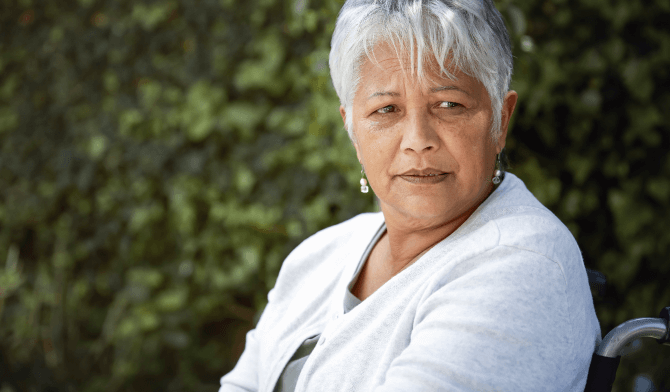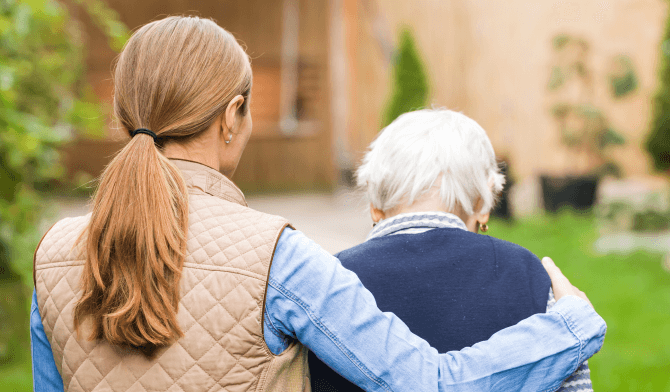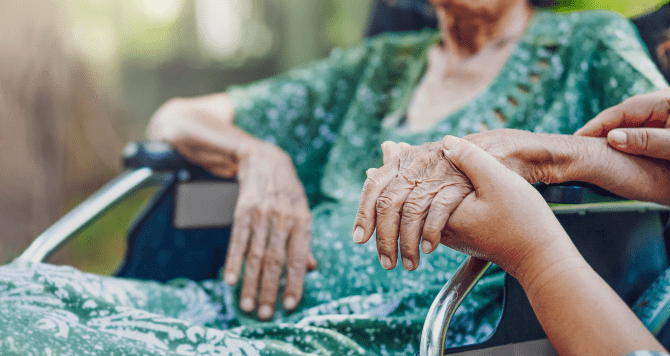What Is Emotional Elder Abuse?
The generally accepted definition of emotional elder abuse is the “intentional infliction of anguish, pain, or distress through verbal or nonverbal acts.” This includes threatening, harassing, intimidating, and attempting to humiliate an elderly individual.
Sadly, emotional abuse may be one of the most common forms of elder mistreatment. Nearly 1 out of every 3 nursing home staff members admitted to psychologically abusing residents, according to the World Health Organization (WHO).
Examples of emotional elder abuse include:
- Degrading statements
- Humiliating language
- Intentionally causing long waits for food, medication, or basic care
- Interfering with decision making
- Making false accusations
- Verbal aggression
- Placing an elder’s assistive devices out of reach (walker, cane, glasses, or dentures)
- Scolding elderly individuals
- Threats of social isolation


Emotional elder abuse involves controlling the elderly person’s freedom to intentionally cause feelings of isolation, low self-esteem, and emotional pain. This type of abuse can have a severe negative impact on the mental health and overall well-being of elders.
Because motional elder mistreatment is so harmful, many families choose to take legal action by working with elder protection groups, law enforcement, and attorneys.
Our team can provide help and support if your loved one has suffered from emotional abuse in a nursing home.
Types of Emotional Elder Abuse
The NCEA notes that psychological elder abuse can come in many forms. If an older person’s mental state or emotional well-being is harmed through words or actions, they may have suffered from psychological abuse.
Types of emotional elder abuse may include:
-
Verbal harassment
This occurs when a family member or caretaker yells at an elder, bullies them, or otherwise belittles them.
-
Psychological torment
Caregivers or family members may psychologically manipulate an elder by threatening them or blaming them for problems they didn’t cause.
-
Isolation
Isolating the elder from friends, family, or social occasions can lead to increased loneliness and mental health problems like depression.
Generally speaking, emotional elder abuse can be broken down into verbal and non-verbal emotional abuse. Non-verbal emotional elder abuse can be particularly difficult to prove, however, both types can cause the victim severe emotional pain and suffering.
Examples of Verbal Emotional Elder Abuse
- Being mean or extremely cold
- Blaming the elderly person, especially for things beyond their control
- Causing guilt or shame
- Embarrassing the individual, especially when others are around
- Insulting, ridiculing, or name-calling
- Intimidating
- Talking to the nursing home resident as if they were a child
- Threatening to harm the elderly individual
- Yelling, screaming, or swearing
Examples of Non-Verbal Emotional Elder Abuse
- Hiding personal belongings
- Giving the silent treatment
- Ignoring the individual
- Isolating an elderly individual from other residents
- Limiting access to basic necessities, such as food, water, or the restroom
- Restricting a person from socializing
- Terrorizing when no one is around
In addition to being either verbal or non-verbal, emotional elder abuse can be intentional or unintentional. This depends on whether the abuser wants to hurt the victim, or if they are overly stressed from caregiving and lash out against their own will.
Emotional Elder Abuse Risk Factors
A study published by the Journal of the American Geriatrics Society identified several risk factors for emotional elder abuse.
Elders are at a higher risk of emotional abuse if they:
- Are divorced or separated
- Have mental or physical impairments
- Live in a lower-income home


These factors were also associated with a greater risk of physical abuse, the study noted.
Race may also be a risk factor for emotional elder abuse. According to a study reported by the NCEA, black Americans may be more likely to suffer from both emotional and financial abuse when compared to white Americans.
Further, a recent study from the Journal of Family Violence found that elders who needed help with activities of daily living (such as getting dressed) were more likely to be emotionally abused by their family members.
Emotional Elder Abuse Risk Factors Among Caregivers
Researchers have also identified several factors that make caretakers more likely to commit emotional abuse. All these factors relate to the stress of caregiving.
Caregivers may commit emotional elder abuse if they:
- Can’t control their own temper or mood
- Feel angry or resentful towards the elder
- Have a poor relationship with the elder
These factors come from a study of over 800 cases of elder emotional abuse published by the Journals of Gerontology.
Who Can Commit Emotional Elder Abuse?
Almost anyone is capable of committing emotional elder abuse, from loved ones to strangers who are supposed to provide care. Below, learn more about why different groups of people commit emotional abuse.
Family Members
It’s hard to believe that some family members harm their elderly loved ones. Sadly, all too often, adult children or spouses psychologically abuse elderly loved ones they’re supposed to care for.
For example, an older man was subjected to emotional abuse by his own wife for several years. His wife threatened him with a knife and burned his clothes. The abuse was only discovered after he was hospitalized for a fall, prompting social workers to conduct welfare checks on the couple.
Nursing Home Staff Members
Staff members at nursing homes or other assisted living facilities are supposed to provide high-quality care to older people. However, factors such as understaffing, overworking, and bad attitudes can turn these caregivers into abusers.
In 2018, two staff members emotionally tormented a 91-year-old nursing home resident with dementia by shoving a nursing home gown in her face. The staff members were arrested, and the woman’s family later filed a nursing home abuse lawsuit against the facility.
Other Caregivers
In addition to nursing home staff members, live-in nurses or conservators (legal guardians) may also commit elder psychological abuse.
For example, a live-in caregiver prevented an elderly couple from seeing their other family members for years on end. Upon the older woman’s death, the caregiver didn’t notify her relatives and cremated her against her wishes. The older man also became aggressive and hostile to his adult daughter due to the caregiver’s influence.
Warning Signs of Emotional Abuse in the Elderly
Emotional abuse can sometimes be hard to identify, as it doesn’t leave physical injuries. That said, there are several signs that may indicate your loved one has suffered from emotional elder abuse.


Signs of emotional abuse in elderly include:
- Agitation
- Avoidance of eye contact with a specific caregiver
- Being shyer than usual
- Confusion that is unrelated to any health problems
- Cowering when the abuser is around
- Fear, especially of their caregiver
- Having low self-esteem
- Increasing depression
- Nervousness
- Passivity
- Reluctance to talk openly
- Rocking back and forth
- Sadness or depression
- Self-isolation
- Self-neglect or harm
- Sudden changes in sleeping or eating patterns
- Withdrawal
These indicators serve only as a guide for suspecting cases of emotional elder abuse. It is important to note that the presence of one or more of these behaviors is not definitive proof but rather should trigger further investigation.
Sadly, if emotional elder abuse is occurring, it may also mean that other types of abuse are occurring. This makes it imperative to take all warning signs seriously to keep vulnerable individuals free from harm and distress.
Reporting Emotional Abuse in the Nursing Home
Emotional mistreatment should be reported to get elder abuse victims out of danger. The following agencies can take different types of action, depending on the situation.
You can report emotional elder abuse cases to:
- A local branch of Adult Protective Services (APS)
- A domestic violence hotline (if the abuser is a family member)
- Elder abuse lawyers
- Nursing home ombudsmen
- The police
For instance, APS agents or a nursing home ombudsman can help determine if elder abuse and/or neglect is taking place if you aren’t sure. They can then recommend next steps depending on what they find.
Working with the police may be a more suitable option in severe cases, such as when an elder has suffered from both emotional and physical abuse. Filing a police report can help bring the abusers to justice.
Sadly, a report from the U.S. Department of Justice (DOJ) found that for every case of emotional elder abuse that is reported, 12 are not reported. This fact underscores the importance of reporting possible cases of abuse — even if you’re not totally sure that it’s taking place.


What Happens After Reporting Emotional Elder Abuse?
If elder emotional abuse has taken place, it’s critical to make sure the elder is out of harm’s way.
You may need to:
- Fire abusive or neglectful live-in caretakers
- Relocate the elder from their current living arrangement to a safer one
- Take the elder to a doctor or psychologist
In very severe cases, the elderly person may require calming medications to help them sleep better and be able to cope with the emotional distress they have experienced.
You might also want to get in touch with a nursing home abuse lawyer to discuss your legal options. By working with a lawyer, you may be able to access compensation to cover medical treatments and other expenses.
Treating Cases of Elder Emotional Abuse
Victims of elder emotional abuse may be placed in adult day care or have other special services provided to ensure their safety. Additional ways to treat elder emotional abuse include counseling and medication.
Elder emotional abuse may cause the victim to feel depressed, scared, or extremely anxious. Talking through their feelings with a counselor may offer some relief.
If counseling alone does not help, the elderly individual’s health care provider may also prescribe medication for relaxation or help with sleeping.
Statistics About Emotional Elder Abuse
Emotional elder abuse is the most common form of elder abuse. Sadly, it is often considered a normal part of caregiver stress and is not properly reported and documented.
In a study by the National Institutes for Health (NIH), interviews with a group of over 200 nursing home staff members indicated that, “a total of 81% of the staff reported that they had observed and 40% had committed at least one incident of psychological abuse during the same 12-month period.”
The NIH report also uncovered the following alarming statistics:
- 70% of staff said they observed other staff yelling at residents
- 50% of staff said they witnessed a fellow staff member insulting residents
The staff members who were interviewed reported that their fellow caregivers committed substantial levels of abusive behavior. The most common type of emotional elder abuse was yelling at a resident with swears or insults.
Get Help For Emotional Elder Abuse
Emotional elder abuse remains a big problem for older adults living at home or in long-term care facilities. If you believe an older person you love has suffered, it’s crucial to take action. Thankfully, our team may be able to help you do so.
By taking action, you can:
- Hold abusive nursing homes and staff members accountable
- Pursue financial compensation
- Start the healing process
Don’t wait. Get a free case review to see if we can help you.
Elder Psychological Abuse FAQs
What are some of the emotional impacts of elder abuse?
Older people who are psychologically abused may suffer mental health problems like anxiety and depression. Some may never fully recover after suffering from emotional elder abuse.
What could be considered emotional elder abuse by a family member?
If family members scream at their older loved ones, threaten them, or prevent them from seeing others, they may be committing emotional abuse.
For example, an elderly woman was locked in her room for up to 12 hours at a time by her daughter and granddaughter, who were supposed to be caring for her. Under her family members’ watch, she suffered from various injuries, including bedsores and a maggot infestation.
Why does emotional elder abuse happen?
People may commit emotional elder abuse for a variety of reasons. They may get overwhelmed from caring for an older person, or they may resent having to care for them in the first place. The underlying causes can vary with each case.
Regardless of why emotional elder abuse occurs, there is never an excuse for it. Elders deserve high-quality care free from harm, making it of utmost importance to report emotional elder abuse if you notice that it’s happening.
Can you sue for emotional elder abuse?
Yes. You may be able to pursue legal action if someone you loved was emotionally abused. You can also file a claim if your loved one suffered from another type of abuse, such as physical or sexual abuse.
Contact our team to see if you’re eligible to take legal action.


